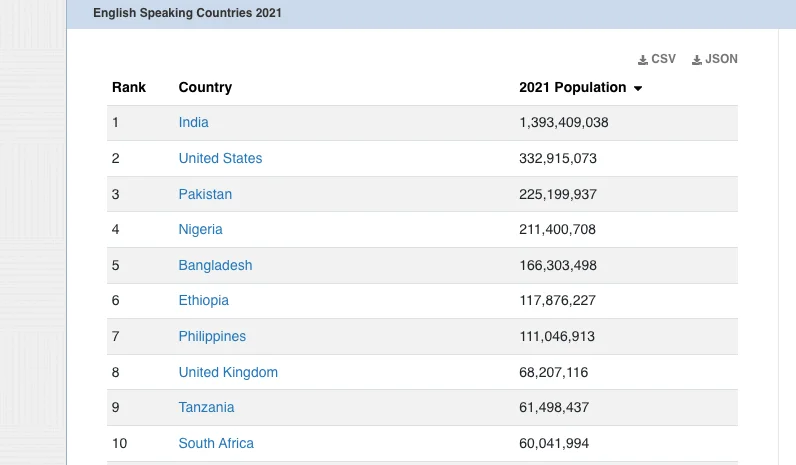
English remains to be the most spoken language in the world.
Currently, there are approximately 1.3 billion English speakers in the world. Chinese (Mandarin) closely follows second with 1.1 billion speakers. Rounding up the top three is Hindi, registering 600 million speakers.
For aspiring international students who are planning to study abroad, this statistic alone should encourage one to have average to excellent communication skills in English. Higher education institutions should also take note of how they could build a better learning environment and enhance the international student experience through communicating their programs and policies in English. This stresses the importance of English in education.
Key Points at a Glance
- There are currently 1.3 billion English speakers in the world
- Top destination countries (United States, Australia, United Kingdom, Canada) for study abroad are densely populated by English speakers.
- Learning how to communicate in English is important for a student’s entry, instruction, communication, and networking.
- While English proficiency is important, higher education institutions (HEIs) need to recognize that it is not the sole measure for a student’s capacity to learn.
- In response, HEIs need to be ready to provide support where students’ lack in terms of their English proficiency.
In the context of international education, the top four countries (United States, Australia, United Kingdom, Canada) selected by students as their best study abroad destinations are heavily populated by English speakers. With the exception of the United States, the rest have English as an official language, and as their language of instruction in higher education.
In the highly unusual case of the United States mentioned here, this proves that there are nations where English is a de facto national language although it is not recognized legally. Therefore, one may also approach the numbers by matching English-speaking countries and their current population, and ranking them.
Top 10 English-Speaking Countries Ranked According to Population (June 2021)

This is encouraging for international education, as some of these countries are known sending countries. Therefore, an assumption could be made that students taking pathway programs may have had experience in reading, writing or speaking English in one way or another.
Importance of English proficiency for study abroad
While there are several aspects as to how a student’s English proficiency can affect his or her studies and subsequently his or her career, these can be narrowed down to four basic reasons why learning English for foreign students is important.
Entry. The most basic “use” of English is gaining entry into an institution. As previously discussed, most countries that are receiving international students have a dense population of English speakers and are therefore more inclined to, as they probably have for decades, deliver their curricula in English. That said, most if not all higher education institutions require incoming students to submit their scores from English proficiency tests like IELTS, TOEFL etc. These scores must meet the minimum set by the institutions. Aside from the tests, some institutions offer programs, which, upon completion, could serve as a requirement entry to some colleges.
Instruction. With English considered as a global language, most academic activities and requirements are delivered in English. Most books are written in English. Most audio, video learning materials are produced in English. Information on the internet is often written in English.
In fact, many scientific papers and research works are written and published in English. In the Netherlands, the ratio of English works compared to those written in Dutch is 40:1. A 2012 study also has interesting numbers. Of the more than 21,000 articles from 239 countries in SCOPUS, the world’s largest database for peer-reviewed journals, 80 percent were in English.
Communication. The holistic school experience is more than just what is discussed in the classroom. This is more so the case for international students. From the moment he or she leaves his or her home country, acclimatizing to the foreign environment, to getting comfortable with classmates; making friends, and providing feedback to his or her professors—being able to communicate one’s ideas properly is tantamount to one’s growth.
Since English is the official language of 53 countries, a student with average to excellent English communication skills will have a great chance of building, growing and maintaining healthy relationships.
Networking. When one is able to meet acquaintances and build friendships, naturally, this opens up multiple opportunities to network. Eventually when a student graduates from the institution, he or she would be part of the labour force now looking to jumpstart their careers.
At this point, especially for those looking to find work in countries outside of their hometowns, one can only appreciate the fruit of having to go through time in school and meeting all sorts of people. In fact, there’s a great possibility that old friends and possibile business partners may engage in conversation on social media in English—half of the internet content is in English.
English as a first language
“But no matter how I try, I just don’t see myself communicating in English as my first language,” one student may think to himself. The good news is that while there is great opportunity to learn more through international education, it does not necessarily mean compromising one’s identity and culture to the point of homogenization.
The past few decades have boosted international education through multiple various pathway programs. While it is understable why English is so important and is the primary language of choice, for non-native English speakers, it can be learned and utilized as an alternative means of connection.
A 2015 study revealed that while “English proficiency is associated with international students’ academic performance,” there “may be many other factors” which could lead to a student’s academic success. It is important to be reminded that one’s mastery of the English language is not necessarily a tool to gauge a student’s capacity to learn. In fact, the study suggests that international students who spoke more than English tend to do better in school.
“International students, who spoke at least three languages, had the highest mean GPA. This, perhaps, implies that some people tend to learn foreign languages better and once they overcome barriers related to one foreign language, they are more likely to learn another language and be successful,” the study stated. However, it also clarified that this was a mere assumption and more research work on the subject matter could be helpful.
While international students and higher education institutions understand completely why English is so important to their success, at the very least, this article should be a good reminder that learning English for foreign students could play to their advantage, while higher education institutions should provide students with various support services that contribute to their academic needs, regardless of where they currently find themselves in terms of English proficiency.
Read more:
Data sources:
Szmigiera, M. (2021, March 30) The most spoken languages worldwide 2021. Statista. Retrieved from https://www.statista.com/statistics/266808/the-most-spoken-languages-worldwide/
Ireland, S. (2021, February 10) Revealed: World’s Best Countries For International Students, 2021. CEOWorld Magazine. Retrieved from https://ceoworld.biz/2021/02/10/revealed-worlds-best-countries-for-international-students-2021/
Countries with English as an Official Language and the Language of Instruction in Higher Education. NC State University. Retrieved from https://projects.ncsu.edu/grad/handbook/docs/official_language_english.htm
English Speaking Countries 2021. World Population Review. Retrieved from https://worldpopulationreview.com/country-rankings/english-speaking-countries
Business Environment Communication (BEC) Program. Eton College. Retrieved from https://etoncollege.ca/courses/business-environment-communication-bec-program/
Huttner-Koros, A. (2015, August 21) The Hidden Bias of Science’s Universal Language. The Atlantic. Retrieved from https://www.theatlantic.com/science/archive/2015/08/english-universal-language-science-research/400919/
Weijen, D. (2012, November) The Language of (Future) Scientific Communication. Research Trends. Retrieved from https://www.researchtrends.com/issue-31-november-2012/the-language-of-future-scientific-communication/
Zazulak, S. (2015, August 21) English: the language of the internet. English.com. Retrieved from https://www.english.com/blog/english-language-internet/
Martirosyan, N. (2015) Impact of English Proficiency on Academic Performance of International Students. Journal of International Students. Retrieved from https://files.eric.ed.gov/fulltext/EJ1052835.pdf

